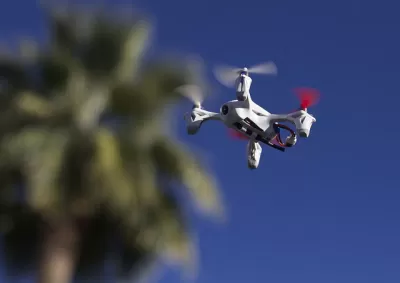The National League of Cities is preparing for a future where cities will need to regulate the use of airspace by commercial drones.

"While fully self-driving cars may still be a decade or so away, remotely piloted and even automated drones are already here," according to an article Elias Stahl, and it's time for cities to prepare for the expanded use of drones.
According to Stahl, the Federal Aviation Administration released regulations for the use of drones in U.S. airspace in June in anticipation of the number of drones growing "from 2.5 million in 2016 to 7 million by 2020…" But those federal regulations "leave the bulk of enforcement and regulation to local and state government."
There are already examples of cities deploying drones for their own purposes, but as with many other forms of mobility, innovation so far is outpacing regulation. To advance the role of cities in maintaining control of their airspace, the National League of Cities released a new "Cities and Drones" [pdf] guide for municipalities. "The challenge for local officials will be crafting policy and regulations that enable this drone technology to serve their cities best, embracing innovation, while still considering the safety and privacy concerns of their residents," according to Stahl.
FULL STORY: Drones Will Have an Impact on Your City. Here’s What You Need to Know.

Alabama: Trump Terminates Settlements for Black Communities Harmed By Raw Sewage
Trump deemed the landmark civil rights agreement “illegal DEI and environmental justice policy.”

Planetizen Federal Action Tracker
A weekly monitor of how Trump’s orders and actions are impacting planners and planning in America.

The 120 Year Old Tiny Home Villages That Sheltered San Francisco’s Earthquake Refugees
More than a century ago, San Francisco mobilized to house thousands of residents displaced by the 1906 earthquake. Could their strategy offer a model for the present?

In Both Crashes and Crime, Public Transportation is Far Safer than Driving
Contrary to popular assumptions, public transportation has far lower crash and crime rates than automobile travel. For safer communities, improve and encourage transit travel.

Report: Zoning Reforms Should Complement Nashville’s Ambitious Transit Plan
Without reform, restrictive zoning codes will limit the impact of the city’s planned transit expansion and could exclude some of the residents who depend on transit the most.

Judge Orders Release of Frozen IRA, IIJA Funding
The decision is a victory for environmental groups who charged that freezing funds for critical infrastructure and disaster response programs caused “real and irreparable harm” to communities.
Urban Design for Planners 1: Software Tools
This six-course series explores essential urban design concepts using open source software and equips planners with the tools they need to participate fully in the urban design process.
Planning for Universal Design
Learn the tools for implementing Universal Design in planning regulations.
Clanton & Associates, Inc.
Jessamine County Fiscal Court
Institute for Housing and Urban Development Studies (IHS)
City of Grandview
Harvard GSD Executive Education
Toledo-Lucas County Plan Commissions
Salt Lake City
NYU Wagner Graduate School of Public Service



























